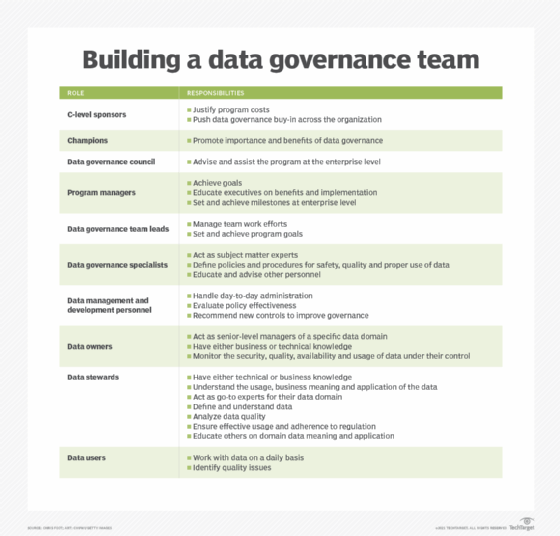
sommai - Fotolia
Who belongs on a high-performance data governance team?
Putting together a high-quality data governance team can be a challenge. Explore the necessary team members and best practices for a high-performing team.
From small shops to Fortune 500s, there is one common component that improves a business's ability to fully utilize high-quality data across an organization: a focus on data governance. The ultimate success of data governance initiatives falls to the team responsible for creating, implementing and updating data governance policies and procedures and marketing their benefits to the enterprise.
The size of a business should never be a determining factor for treating data as an enterprise asset. From a two-person shop to a staff of 20,000, all businesses need to ensure the quality, security and consistency of their data stores. The only difference should be the size of the team responsible for ensuring effective data governance across the organization.
What is data governance?
Data governance is the strategic program that defines the roles, rules, processes and best practices an organization should follow to ensure the safety, quality and proper use of data. Data governance provides a blueprint of controls to guarantee effective management of data at the enterprise level.
The inputs to data governance are standard IT community best practices, as well as corporate, industry-specific and governmental regulatory framework specifications. The program is a joint business and IT initiative with both departments playing equally important roles.
Data governance policies primarily focus on business outcomes. They are technology-agnostic controls that have universal application across the organization.

High-quality data governance team
There is one common factor primarily responsible for the success of any business or technical initiative: the quality of the data governance team tasked with achieving the project's goals.
Focused best practices to build a highly effective data governance team include:
Well-defined goals. The first step is to create a data governance program charter that defines the scope, objectives and goals the data governance team will achieve. The charter also documents the team's makeup, including roles, responsibilities and authorities. The data governance team will use the program charter to educate the organization on its enterprise-wide goals, activities and responsibilities.
Good communication. Not all decisions on data governance are easy. The team will face many challenges that have several potential solutions. Each person must feel comfortable expressing their opinions. Additionally, team members need to effectively articulate the benefits of good data governance to other personnel. From operational support technicians to the C-suite, data governance teams must obtain buy-in from their fellow employees to be successful. The team must realize many recommendations will lead to an increase in workloads at all operational levels and be able to communicate why the increase is necessary.
Passion for data governance. Each team member becomes an evangelist for good data governance. Marketing the benefits of good data governance has a much greater chance of obtaining enterprise-wide buy-in than a dictatorial approach. Additionally, implementing a data governance framework is challenging. Team members need to be resilient to overcome the challenges, delays and setbacks of implementation.
The right people with the right skills. Data governance specialists are often challenging to find and can be expensive, but that doesn't prevent you from promoting one. Identify personnel who express an interest and provide them with the time and training to learn all about data governance. You can build the team based on budgetary constraints and the employee assets you have available.
Effectively utilize internal and external resources. A data governance team needs to establish strong relationships with data management and business units, as business personnel provide critical insights to create data usage and control policies. Data governance teams need feedback from data management personnel responsible for adhering to their policies. A control that looks good in a policy document may not work as expected during operational implementation. And data management teams often identify opportunities for new controls and provide recommendations to improve existing policies.
Data governance roles and responsibilities
The roles and responsibilities below are inherently fluid by nature and depend on the size of the organization. Some of the roles are full time, while others are part-time responsibilities. Many of the ground-level, operational data governance activities will be distributed to business and technical teams that interact with the data elements on a daily basis.
- C-level sponsors. Creating a data quality mindset begins at the top of the org chart. In addition to promoting the benefits of good data governance across the enterprise, the C-level sponsor will have to justify the program's costs. Data governance comes with a price tag. This includes team salaries, tool purchases and the overhead costs of additional activities business and IT personnel will need to perform to adhere to data governance policies.
- Champions. Evangelizing the benefits of effective data governance is critical to the success of the initiative. Although this is a key responsibility for all team members, champions can come from any position in the organization.
- Data governance council. This is a working team of business executives and high-level IT management personnel who focus on advising and assisting the program at an enterprise level.
- Program managers. They are responsible for achieving the program's goals. Because many of the data governance activities are distributed across the organization, program managers will interact with multiple business and IT support departments. They are responsible for the success of the initiative, educating company executives and managers on its implementation and benefits, and setting and achieving milestones and goals at an enterprise level.
- Data governance team leads. They are responsible for managing data governance team members' work efforts and setting and achieving goals that help to contribute to the overall success of the program.
- Data governance specialists. They are subject matter experts who define policies and procedures to ensure the safety, quality and proper use of enterprise data. In addition to their business acumen, analytics, data administration and documentation skills, the team members often act as educators and advisors to other personnel.
- Data management and development personnel. These team members are responsible for the day-to-day administration of the organization's data infrastructure and applications. Their interactions with business units and experience working with the data at an operational level allow them to evaluate the effectiveness policies have in achieving their stated goals. They also recommend new controls to improve data governance.
- Data owners. Data owners are usually senior-level managers of units who produce or are the primary owners of a specific data domain. Depending on the type of data, owners can be either business or technical personnel. They are the decision-makers responsible for the overall security, quality, availability and usage of the data under their control.
- Data stewards. Data stewards can be technical or business personnel. Because of their daily support activities, data stewards have a strong understanding of data usage, business meaning and application. As a result, they are the go-to experts for their data domains. They are responsible for defining and understanding data, analyzing its quality, ensuring its effective usage and adherence to regulatory controls, and educating others on its meaning and application.
- Data users. These data governance team members work with data on a daily basis. Because of their daily interactions with the data elements, users are often the first ones to identify quality issues.
Bottom line
Establishing a strong data governance team requires a blend of technical knowledge and business savvy. Be sure to include a balance between the two for a successful data governance framework.








